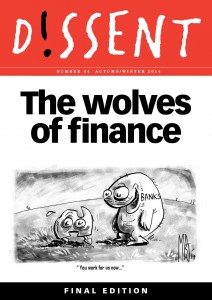Edition Number: 44
Number 44, Autumn/Winter 2014 is the final edition of D!SSENT. Current subscribers should log in as usual. Non-subscribers wishing to purchase this issue should click on Subscribe above. Enquiries about purchasing earlier print issues (see Editions above) should be sent to dissentmagazine@dissent.com.au
For those people wishing to print out the entire magazine a PDF copy may be downloaded by pressing the button below. For those people wishing to read the magazine directly on their computer or tablet screen, follow the link below against each individual article to view that article in a format best meeting their needs.
Download this edition as a PDFThe wolves of finance
Editorial: The expansion of the size and power of the global financial sector over the last 25 years has been at the expense of economic growth. This has been characterised by increased financial instability, rising indebtedness of households, and continued decline in wages share of income. In Australia the declining productivity of financial institutions is being supercharged by compulsory superannuation.
Protecting capitalism from itself
Ian McAuley argues that the greatest threats to democratic capitalism are the false beliefs that inequality doesn’t matter because the rich can be relied on to invest their growing wealth productively and the related idea that material wealth and virtue are inseparably linked to each other. This leads to corrosive social relations, even if the rich are prepared to make generous payments to avert overt poverty. These transfers are increasingly at the expense of public spending in areas such as health, education and infrastructure which are necessary if everybody is to participate in society.
Urban transport – correcting the mistakes of the past
John M. Legge: Describes how large cities are necessary for citizens to participate to the maximum in the civilised life. This requires planning based around heavy and light rail networks which can bring people to large activity centres. Reliance on the car causes congestion and the destruction of amenity for car parks. The cost for Los Angeles is that it has more than a dozen activity centres – all less than a quarter the size of the Melbourne and Sydney CBD.
Abortion opponents on the march again: beware of men in blue ties
Anne O’Rourke discusses efforts, – emboldened by the recent political ascendency of Tony Abbott – to restrict women’s rights to abortion, specifically federal moves to restrict sex selection abortion, a law to recognise foetal personhood in NSW and, in Victoria, to rescind of the obligation of doctors with conscientious objections to abortion to refer a pregnant woman to a doctor without conscientious objections to abortion.
Friend and foe; China the benefactor and challenger
Derek Woolner questions the assumption that there is no conflict between the Australia’s reliance on China as an export customer and the rise of China as a major military power with ambitions in the region backed by strong navy and marine forces rather than within the framework of the UN Convention on the Law of the Sea.
A review of the reviewer
Ian Morgan looks at the background of Education Minister Christopher Pyne’s appointment of Kevin Donnelly (and Ken Wiltshire) to review the national curriculum. Both are strident critics of the national curriculum and at least in Donnelly’s case a long-term critic of the ‘cultural left’ in Australia. The article looks particularly a Donnelly’s revealed attitudes to disadvantaged students (he rejects Gonski), religion, history and sex education which are permeated with his Catholic beliefs.
Pyne’s school autonomy myth
Trevor Cobbold points to authoritative international and national studies which show that greater school autonomy in curriculum and assessment tends to improve outcomes, but greater school autonomy in budgeting and staffing has little or no effect. Government policy is to centralise curriculum and make schools responsible for managing their resources.
Widening the gap – indigenous affairs
Liz Curran points out the implications for aboriginal Australians of the decision to cut funding for Aboriginal and Torres Strait Islander Services. Curran gives individual examples to show how early intervention to give aboriginals effective access to services and avoid jail helps to close the gap between aboriginal and non-aboriginal people and saves taxpayers’ money.
Preferences R Not Us
Robbie Swan managed the Senate preferences deal for the Sex Party in the September 2013 federal election. He describes how NSW Senator-Elect David Leyonhjelm caused the Sex Party to miss out on the sixth seat in Victoria while gaining vital Sex Party preferences for himself in NSW.
The ABC – A linchpin in Australia’s democracy
Mick Trimmer examines the history behind the antipathy of the Abbott government to the ABC and the four enquiries initiated into the ABC by coalition governments which have found that the institution has widespread public support. He finds that the ABC’s independence has been buttressed by strong community support. Attempts by conservative governments to undermine the independence of the ABC have been limited to funding cuts rather than changes to its charter.
DISSENT magazine’s thoughtful and critical discussion of public affairs includes social and economic policy, education, politics, science and the environment, cultural matters, media and the arts. Read More



